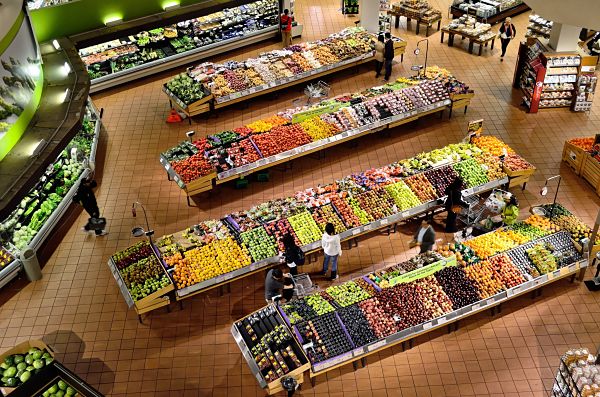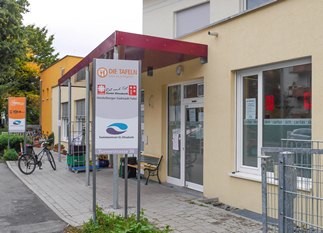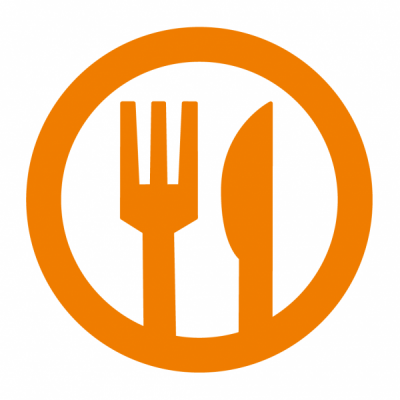by Faeimm Tang
Have you ever wondered what happens to packets of fresh, ready-to-eat leafy salads in supermarkets if they are not sold by their “Verbrauchsdatum” (use by date)? What about tubs of ready-made potato salads? Dairy products? Breads and rolls from the bakeries? Where do foods sold in supermarkets go if no one buys them before they expire? What is the difference between “Verbrauchsdatum” and “Mindesthaltbarkeitsdatum – MHD – best before date?

Unlike in France, where it is now against the law to throw away or destroy unsold food, edible food is too often wasted in Germany, unnecessarily disposed of when it cannot be sold. The Food and Agriculture Organization of the United Nations (FAO) reports that one third of the food produced along the value chain worldwide are lost or wasted, while almost a billion people around the world do not have enough food to lead a healthy, active life.
About the German “Tafel”
In Germany, there is a nationwide charity movement called “Tafel”, which literally translates as (dinner) table. Basically, it collects surplus food items and distributes them to those in need. The name “Tafel” is a registered trademark of the Bundesverband Deutsches Tafel e.V. (German Federation of Food Pantries) – an organization that manages food pantries all over Germany, in cooperation with registered associations (e.V.) or sponsors (charity and voluntary organizations such as Caritas and Deutsches Rotes Kreuz) who provide financial backing.
The German “Tafeln” was founded in 1993 and today, there are over 930 affiliated “Tafelläden“ food pantries in Germany. They provide their affiliated food pantries with operation “know-how“ via seminars, training and quality/hygiene certifications. These affiliates have the word “Tafel” in their names.
Heidelberger Südstadt Rat und Tat Sankt Elisabeth

To understand how a typical “Tafelladen” works, I met with Mr Siegbert Körnig, the team leader at Heidelberger Südstadt-Tafel Rat und Tat Sankt Elisabeth, a food pantry jointly sponsored and operated by Caritas Heidelberg and SKM. The interview was conducted in German, and I’ve summarized our conversation as follows:
The food pantry Rat und Tat St. Elisabeth was founded in December 2007, and they collect food from supermarkets and bakeries for sale at 10-20% of retail value to those in need. Today, they also receive food and household necessities from wholesalers – for large volumes, the logistics and distribution are coordinated by the regional hub of “Tafeln” in Mannheim, for collection by local food pantries in the Rhine-Neckar region. Currently, Rat und Tat St. Elisabeth collects food from 16 supermarkets and 9 bakeries. According to Mr Körnig, the German “Tafeln” has a nationwide cooperation agreement with Aldi and REWE. Other supermarkets they work with are Lidl and Rossmann. Participating bakeries are K&U, Kamps and Café Frisch. There are 2 other food pantries in Heidelberg, and all three talk to each other to make sure each gets enough food from the regional pool of suppliers.
4. Food items which have passed their MHD but can still be used (Mr Körnig is required to sample these products before the start of each business day to see if the color, smell and consistency have changed)
Rat und Tat St. Elisabeth opens three days a week, 2-3 hours each day, serving people from surrounding neighborhoods. There are approximately 400 registered addresses, and this translates to about 90-120 customers per day, with each customer spending 4-6 Euro for groceries. The customers are mainly east Europeans, but they come from all walks of life – cleaners, lawyers, teachers, students – folks going through a rough patch in life. Before people can purchase from the food pantry, they are required to show proof of a low-income household, for example, “Bewilligungsbescheid über Arbeitslosengeld II“, “Wohngeld“, low pension or small income. They would then be issued an ID card, to be presented every time they make a purchase.
Food pantries need volunteers in order to function. Volunteers collect food from suppliers, sort them out and help with shopkeeping. At Rat und Tat St. Elisabeth, in addition to Caritas part-time employees like Mr Körnig, there are volunteers from the “Bundesfreiwilligendienst” (nationwide organization of volunteers), as well as jobless folks and students who help out for 2.30 Euro per hour (but not exceeding 200 Euro per month). Running a food pantry is a challenging job – for instance, personnel are needed to manage the logistics of food collection including truck waiting time at suppliers, to keep track of incoming food donations and sales, to schedule duty roster of available volunteers, and to make sure the facility meets strict German hygiene standards (the German “Warenkontrolldienst” conducts regular checks).
Lately, there is increasing dependence on food pantries to feed the needy, and pressure is building. Mr Körnig cites the example of the Nürnberger Tafel, which shut down unexpectedly early this October because its 160 volunteers were consistently overwhelmed by collecting and distributing 25 tonnes of food 5 days per week to the needy. City authorities could not offer assistance, and consequently, roughly 6000 people went hungry for 10 days. In the meantime, the Bayerische Rote Kreuz stepped in to help tide things over till this Christmas. The city of Nürnberg is now looking for a new sponsor for the Nürnberger Tafel.
How we can help
1. Material donations – for example, diapers, and non-perishable staple foodstuffs. Large supermarket chains and small retail grocery stores have improved their inventory planning, removing far fewer items from the shelves and discounting items that are about to expire. The food-pantry trucks are still getting enough fruits and vegetables, but there has been a steady decline in the supply of pasta, dairy products and meat.
2. Cash donation – the foodstuffs may be free, but collecting them is costly. Like many food pantries, Rat und Tat St. Elisabeth maintains refrigerated trucks, and there is also fuel cost. Donors will be provided an official receipt for claiming tax deduction.
3. Volunteer time – as the famous saying goes, “the best gift you can give someone is your time”. Even if it’s just once every 2 weeks for a few hours, and if it’s not a busy day, volunteers are welcome to stay at the food pantry and interact socially with fellow volunteers and customers alike.
Food Pantries in the Rhine-Neckar region
Here is a list of several food pantries in the Rhine-Neckar region. If you would like to help in any way, drop by the one nearest you. “Jeder gibt, was er kann” – everyone gives what they can.
| HEIDELBERG |
|
Name: Heidelberger Südstadt-Tafel “Rat und Tat Sankt Elisabeth“
|
|
Address: Turnerstraße 36, 69126 Heidelberg
|
|
Phone: 06221 7781385
|
|
Sponsor: Caritasverband Heidelberg e.V. & SKM Heidelberg
|
|
Name: Heidelberger Tafel e.V.
|
|
Address: Alte Eppelheimer Straße 38, 69115 Heidelberg
|
|
Phone: 06221 166579
|
|
Registered association, mobile food pantry, no shop
|
|
Name: Brot und Salz Diakonieladen
|
|
Address: Plöck 22, 69117 Heidelberg
|
|
Phone: 06221 618190
|
|
Sponsor: Diakonische Werk Heidelberg
|
| HOCKENHEIM |
|
Name: Hockenheimer Tafel
|
|
Address: Im Auchtergrund 1, 68766 Hockenheim
|
|
Phone: 0162 2857282
|
|
Sponsor: DRK Kreisverband Mannheim e.V.
|
|
LUDWIGSHAFEN
|
|
Name: Ludwigshafener Tafel
|
|
Address: Bayreuther Straße 35, 67059 Ludwigshafen
|
|
Phone: 0621 59 17 448
|
|
Sponsor: VEHRA
|
| MANNHEIM |
|
Name: Waldhof Tafel
|
|
Address: Carl-Reuther Straße 2, 68305 Mannheim
|
|
Phone: 0621 12850877
|
|
Sponsor: Caritasverband Mannheim e.V.
|
|
Name: Mannheimer Tafel
|
|
Locations: Neckarstadt, Schönau, Rheinau
|
|
Sponsor: DRK Kreisverband Mannheim e.V.
|
|
EDINGEN-NECKARHAUSEN
|
|
Name: Edingen-Neckarhausen Tafel
|
|
Address: Hauptstraße 103, 68535 Edingen-Neckarhausen
|
|
Phone: 0172 5615232
|
|
Sponsor: DRK Kreisverband Mannheim e.V.
|
|
NEUSTADT a.d. WEINSTRAßE
|
|
Name: Neustadter-Haßlocher Tafel e.V.
|
|
Address: Gartenstraße 19, 67433 Neustadt a.d. Weinstraße
|
|
Phone: 0172 7540810
|
|
Registered association
|
|
SCHWETZINGEN
|
|
Name: Schwetzinger Tafel Appel + Ei
|
|
Address: Markgrafenstraße 12, 68723 Schwetzingen
|
|
Phone: 06202 9314
|
|
Sponsor: Caritasverband für den Rhein-Neckar-Kreis e.V.
|
| WEINHEIM |
|
Name: Weinheimer Tafel Appel + Ei
|
|
Address: Bergstraße 73, 69469 Weinheim
|
|
Phone: 06201 994618
|
|
Sponsor: Caritasverband für den Rhein-Neckar-Kreis e.V.
|


Is there a location in or near Bad Honnef?
LaTina Harris
Check this out: https://www.awo-bonn-rhein-sieg.de/angebote/weitere-angebote/tafeln/bad-honnef.html